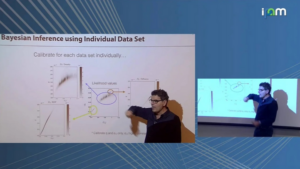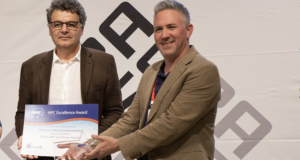The brilliant professional career of Greek scientists abroad is a constant condition. “Greeks, when they leave their country, they excel”, the constant refrain of those who stay behind – either with pride or with regret… Among the leaders, Dr Petros Koumoutsakos.
Starting his journey from Gythio in Laconia, he now teaches at Harvard. His academic background was built gradually, with effort and dedication. Until he arrived today to be honored with the PRACE 2023 HPC Award of Excellence for 2023.
Dr. Koumoutsakos is Professor of Computational Science, Chair of the Department of Applied Mathematics and Director of the Institute for Applied Computational Science at Harvard University. His award came in recognition of his influential contributions to the field of computing as well as innovation in AI. The award took place in Davos (where the video below is from) at the three-day (26-28/06/2023) PASC 2023 (the Platform for Advanced Scientific Computing Conference) conference.
He studied at the Naval Architecture School of the NTUA, completed postgraduate studies in Naval Architecture and Aeronautics, was a National Science Foundation postdoctoral fellow at the California Institute of Technology, he was a NASA fellow, a professor at Stanford University, and was promoted to full professor of Computational Science at ETH Zurich in 2000. In addition, he was one of the initiators of the creation of the Hellenic Institute of Advanced Studies (HIAS), which aims at the interaction of Greek scientists in the diaspora with their colleagues in Greece. In this context, a scientific “school” will be organized at the beginning of July at “Demokritos” and a Symposium at the Eugenides Foundation (03-07/07).
On the occasion of the events at “Demokritos” and the Symposium at the Eugenides Foundation, Professor Petros Koumoutsakos spoke to protothema.gr about the objectives of the Hellenic Institute of Advanced Studies, but also about the “new world” that comes from the applications of Artificial Intelligence.
– How was the idea of creating the Hellenic Institute of Advanced Studies (HIAS) born?
“The Greeks in the diaspora, especially those of us in the sciences, thought that we could organize ourselves to contribute to Greece, as we are a significant potential. What all HIAS members have in common is excellence. And working with our distinguished colleagues in Greece would only benefit the country – after all, we have excellent relations with them. A typical example is the recent interaction we had while preparing a study on Robotics based on international standards. The result of this synergy, combined with the full support of the Greek government, was the creation of a Robotics Unit at the Athena Research Center. In just one year, we started from a report and built a whole Unit! It was a small sample of what can be done in Greece.
There are infinite possibilities for remarkable efforts by Greeks at the international level. If you take right now any of the 30 members HIAS pool, you can start in Greece one of the best universities or research centers in the world – make something even better than Harvard! Let me point out that, one of our primary goals, is for HIAS to help turn “brain drain” into “brain gain”. That is, the leakage of Greek scientists abroad and their return to Greece.
Artificial Intelligence helps to solve problems in many areas
– When did you start working with AI? In what way?
“I started working with AI 25 years ago, in 1996-97, at Stanford University. My subject was neural networks. But our problem was that the computers didn’t have enough power. What we can achieve today in two minutes, back then took a year – it was the increase in computer speed that brought about drastic changes. Through algorithms, I try to find commonalities in things that at first glance don’t seem to be related. In fact, what connects them is mathematics – whether we’re talking about archaeology or aeronautics. You can describe thousands of things with the same equation – only the variables differ. Applications of AI help solve problems in many fields.”
– What is the potential of AI? What is the importance of using it properly?
“AI is an interesting scientific tool, with innumerable applications and possibilities in research – it is not only the engine for reproducing human cognitive functions. Many of its fields, however, still remain unexplored. We continue to explore the potential of AI, which is also moving in new directions – some of which we are unable to grasp.
– What is the point of having tools at our disposal that we cannot perceive and thus cannot use?
“They may not be useful to our generation, but they will be useful to the next. When algorithms were created, we perceived them as ‘toys’. Today, however, behind every credit card transaction are algorithms. Technology evolves, tomorrow you may see combinations you can’t see today. In any case, AI can work to enhance human thinking. Take us further in how we can think.”
– According to the skeptics, or at least the “cautious” ones, there is a danger of losing control if AI is allowed to take over. Is that so?
“I remember a cartoon of Kasparov, the world chess champion, against Big Blue, the supercomputer. Kasparov wins in one move – he unplugs the computer. Something similar applies here. There are certainly tremendous possibilities in AI that can indeed be “unleashed”. But the human factor is always involved in the correct or incorrect use of AI.
The dangers of mobile phones for children
– All this speed in technological development, the “annihilation” of time by algorithms and the “ready-made work” offered by AI, some say, may lead people to…”laziness”. How do you comment on this?
“If you remain a ‘consumer’ of a thing, then yes. That is a danger. But not for those who don’t stop working – they move on, not those who are lazy.
Personally, I fear more for the children, who are more dependent on all this. There are already ‘battles’ with my children, aged 12 and 14, about mobile phones. That is where a lot of attention is needed from the family, the school. So that the next generation does not end up being in front of a screen and only clicking from the consumer’s position. This kind of ‘laziness’ worries me: the absence of questioning, of critical thinking, of contact with nature. Moreover, children are under the impression that by ‘seeing’ knowledge, they are also conquering it. In reality, they are simply consuming knowledge rather than owning it.

– In the discussion about “consumption of ready-made knowledge” and the “intellectual laziness” that it can lead to, what is your position on ChatGPT – the platform that can present ready-made papers to students, for example, in no time? Is it really a kind of “knowledge-ready-to-use”?
“I think that in this I don’t think it’s the kids’ fault. Teachers could think about how to use this ‘tool’ in a more creative way. Personally, I use it in my work for many things: when, for example, I want to incorporate a reference to a source in a text, ChatGPT helps me a lot.”
Correctly linking tools to the problems to be solved
– Contrary to those who argue that machines will “steal jobs” from people, figures presented by the European Union indicate that potentially 60 million jobs could be created in the AI and robotics sectors by 2025. What’s true?
“It’s all about education. Today, in America, AI is being applied in agriculture, for example. New jobs can be created for farmers who know how to operate drones and computers for soil analysis or weather forecasting, among other things. AI will help them to have more efficient crops. They used to go into the fields with cattle and then came the tractors – it all evolves. In essence, it’s about finding the right connection between the tools you have at your disposal and the problems you want to solve. That’s where people and training come in. A head start is gained by knowing what tools are available. Fear of the ‘new’ is unnecessary. Only boldness is needed.”
– Europe and America are on different lines on AI. According to European Commission data on AI, investment in the US ranges from $12.1-18.6 billion, while in Europe it is between $2.4-3.2 billion.
“It’s a combination of factors. I would say it is mainly due to the difference in culture between America and Europe. In America they are more open to challenges, they are not afraid of failing, they take risks. Europe is more conservative. Also, the big companies using AI, like Google and Microsoft, are in the US. The computer chips – the basis of AI – are produced in America or Asia, not in Europe, which is somewhat behind.”
– What changes are considered necessary in society because of the advent of AI?
“AI ideally should be accompanied by the corresponding legal framework. Personally, I intend to organize some courses with scientists in Greece, about AI, computers and their relation to Philosophy, Law. It is very important to start this dialogue. After all, the sciences were once all together. Their separation has weakened ethics – think of how the science of physics was the basis for the atomic bombs…”.
Ask me anything
Explore related questions





